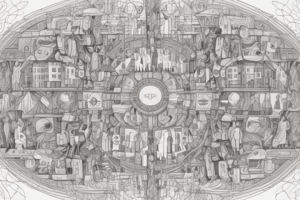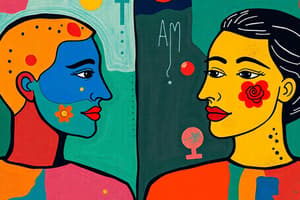Podcast
Questions and Answers
Which of the following is the MOST accurate description of 'human agency'?
Which of the following is the MOST accurate description of 'human agency'?
- The innate understanding of complex social structures.
- The capacity to intentionally influence one's life and surroundings. (correct)
- The power to control the actions of others.
- The ability to predict future events with certainty.
Proxy agency involves an individual acting independently to achieve their goals.
Proxy agency involves an individual acting independently to achieve their goals.
False (B)
What is the term for evaluating one's abilities and making improvements?
What is the term for evaluating one's abilities and making improvements?
Self-Reflectiveness
C. Wright Mills introduced the concept of the ______, which allows individuals to understand their personal experiences within the larger context of history and society.
C. Wright Mills introduced the concept of the ______, which allows individuals to understand their personal experiences within the larger context of history and society.
Match the concepts with their descriptions:
Match the concepts with their descriptions:
What is the primary benefit of frame alignment?
What is the primary benefit of frame alignment?
Frame transformation involves broadening the appeal of a movement without changing its core goals.
Frame transformation involves broadening the appeal of a movement without changing its core goals.
What is the core concept of Filipino social psychology that emphasizes the shared identity and interconnectedness of individuals?
What is the core concept of Filipino social psychology that emphasizes the shared identity and interconnectedness of individuals?
In the context of Filipino psychology, the pronoun 'tayo' (inclusive we) reflects ______.
In the context of Filipino psychology, the pronoun 'tayo' (inclusive we) reflects ______.
According to the study on Holocaust rescuers, what was the primary driver of their altruistic behavior?
According to the study on Holocaust rescuers, what was the primary driver of their altruistic behavior?
Flashcards
Human Agency
Human Agency
The ability to intentionally influence one's life and surroundings, operating through different forms.
Individual (Personal) Agency
Individual (Personal) Agency
Acting independently to achieve personal goals; studying hard to pass an exam.
Proxy Agency
Proxy Agency
Relying on others to act on one's behalf.
Collective Agency
Collective Agency
Signup and view all the flashcards
Intentionality
Intentionality
Signup and view all the flashcards
Forethought
Forethought
Signup and view all the flashcards
Self-Regulation
Self-Regulation
Signup and view all the flashcards
Sociological Imagination
Sociological Imagination
Signup and view all the flashcards
Personal Troubles
Personal Troubles
Signup and view all the flashcards
Public Issues
Public Issues
Signup and view all the flashcards
Study Notes
- These notes cover human agency, the sociological imagination, frame alignment, and the Filipino concept of Kapwa, along with altruism
Definition of Human Agency
- The ability to intentionally influence one's life and surroundings
Types of Human Agency
- Individual (Personal) Agency: Acting independently to achieve goals, like studying hard for an exam
- Proxy Agency: Relying on others to act on one's behalf, like a student seeking help from a tutor
- Collective Agency: A group working together for a common goal, such as a community clean-up
Growing Importance of Collective Agency
- Teamwork and collaboration are crucial in today's interconnected world
- Addressing climate change requires global cooperation
Features of Human Agency
- Intentionality: Setting goals and taking action
- Forethought: Anticipating consequences and planning
- Self-Regulation: Controlling actions and emotions
- Self-Reflectiveness: Evaluating abilities and making improvements
Modes of Human Agency
- Personal agency refers to individual actions to achieve goals, using skills and knowledge
- Proxy agency involves relying on others, especially when lacking direct control
- Collective agency requires a group working together toward a shared goal, dependent on the members' confidence
Social Cognitive Theory and Fortuitous Events
- Fortuitous events and chance encounters can significantly influence life
- How a person responds to random events depends on their characteristics, behavior, and environment (Reciprocal Determinism)
- Self-efficacy, or the belief in one's ability to adapt, affects long-term outcomes
- Human agency has potential to capitalize on events through actions and decisions
Summary of Human Agency
- It allows individuals to influence their lives through individual, proxy, or collective efforts
Features of Agency
- They include intentionality, forethought, self-regulation, and self-reflectiveness
Sociological Imagination
- It can help individuals understand personal experiences within the context of history and society
- People often feel trapped due to a lack of connection between private struggles and broader social forces
Focus of the Sociological Imagination
- Recognizing links between personal troubles and public issues
- Analyzing society as a whole, considering its structure and historical development
- Understanding how different groups are shaped by their time and society
Modern Life
- Characterized by rapid change and uncertainty which may make if difficult for people to find meaning
Role of the Social Analyst
- To examine links between personal experiences and historical/societal forces
- Requires questioning societal structures and how they shape individuals
Critical Analysis of Sociological Imagination
- Encourages looking at systemic causes rather than blaming individuals
- Highly relevant in modern society where economic crises and inequalities persist, but lacks clear solutions
Sociological Imagination summary
- Helps people understand their lives in relation to society and history
- Personal troubles are often connected to larger public issues
- People feel trapped if they don't recognize connections
Frame Alignment
- Involves individuals aligning beliefs with a social movement's goals, achieved through mobilization
- Participation is activity-based rather than based on organizational commitment
- Social movements evolve as people reassess their involvement
Collective Rationalization
- Participants actively discuss and justify their involvement
Critique of Rational Calculus Model
- Participation is a collective, ongoing process, not purely individual, and is shaped by social interactions
- Research must avoid isolating participants from their social networks
Participation Processes
- Can include bloc recruitment, network recruitment, mobilization of sentiment pools, and conversion
Variability of Participation
- Participation varies across different movements depending on movement objectives, organizational structure, and levels of risk
Frame Alignment as a Solution
- It explains participation differences across movements by examining how worldviews shift to align with movement goals
Frame Bridging
- Links ideologically similar but unconnected frames
Frame Amplification
- Strengthens or clarifies an existing frame, either through values or beliefs
Frame Extension
- Expands a movement's frame to include additional concerns
Frame Transformation
- Involves a complete change in how people perceive an issue
Kapwa in Filipino Social Psychology
- Kapwa emphasizes shared identity and interconnectedness and does not separate self from others
- Pakikipagkapwa is a fundamental value with emphasis on humanness in social interactions
Levels of Social Interaction
- Filipino language has 8 levels ranging from superficial civility to deep involvement
- Levels 1-5 are transactional
- Levels 6-8 demonstrate deeper connections
Ibang-Tao
- More formal and distant social interactions
Hindi Ibang-Tao
- Includes deeper more meaningful relationships
Filipino Social Dynamics
- Filipino psychology emphasizes shared identity over self-other distinctions
Kapwa Significance
- Helps in understanding Filipino values, worldviews, and relationships
Filipino concept of Language
- Filipino Pronouns such as "tayo" and "kami" reflect identity
Kapwa Summary
- A unifying principle in Filipino interaction, defining relationships based on shared identity
Altruism Findings
- Altruism is driven by moral identity, not rationality
- Rescuers saw victims as fellow human beings
- Actions were driven by empathy and moral duty
Challenges for rescuers
- They faced extreme risks, but moral conviction overcame fear
Rational Choice Theory
- Challenged by the findings
- Suggests moral values and identity play a significant role in ethical decision-making
Studying That Suits You
Use AI to generate personalized quizzes and flashcards to suit your learning preferences.




